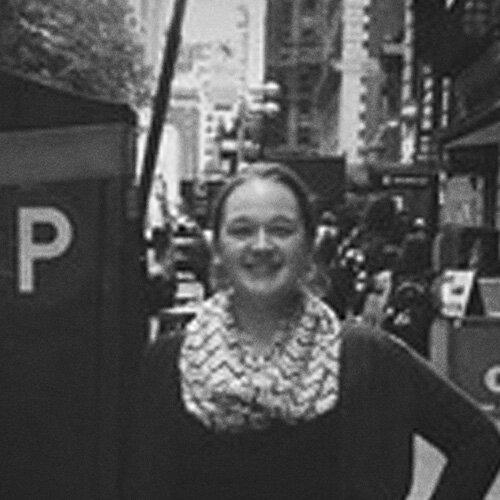Frustrating Mystery #1: It Seems Like There’s No Job Opportunities Out There
Beloved Contributors
The Void
I’d like you to visualize a black void.
In that void, sits the Freelancer. The dancing light of their screensaver illuminates two hands, clasped in prayer. They desperately vow their allegiance to disparate gods, asking only one favor in return: that Work will come their way. It is not known where the Work comes from, but surely it’s supernatural.
Now I walk in. I turn on the lights.
HAHA. Freelancers look really silly.
But besides that, what do we see? We learn that it’s not a black void after all, its an office! There’s even other people there. They call themselves Producers and Production Managers but they kinda sorta look like Freelancers. Maybe we can talk to them and figure out where they’re getting all this Work from?
Butterflies & Revelations
Until there’s an email in our inbox, we’re often clueless about when our next job is coming or who it's going to be with. But it doesn’t have to be that way. Those jobs that came your way weren’t random, they were solutions driven by business needs weeks in the making.
Entire careers exist around scheduling the industrial chess board. These chess masters are known as Production Managers. If you could understand the pieces at play moving the way they do, what would that knowledge empower you to do? Could you forecast Work like weather? Plan around that forecast? Use it to acquire more Work?
When your only clue is your inbox, it seems to come out of the blue. But with the right knowledge, you could be proactive and approach companies when they need your help instead of throwing your line in the water after all the fish have already been fed.
With this post I wanted to demystify much of the frustration that permeates life as a freelancer. Not finding work, not getting hired, not hearing back from applications; sound familiar? When we run into these problems it’s easy to look inward and say we're just not good enough. But to understand the whole truth, we need to see the industry from a clearer vantage point. Let's dive in.
Frustrating Mystery #1:
It Seems Like There’s No Job Opportunities Out There
What’s Going On Behind The Scenes
"I just work off what I know: the busy season and the slow season. [When you know this] as a freelancer at least you don’t lose your mind because you just know this is when companies aren’t typically hiring.” -Rob Hoffman, Atrium Staffing
Not every month offers equal opportunity. There are busy times and there are times when work is scarce. I learned this the hard way when I first moved into New York City in January. After living at home my whole life, FINALLY I had stashed away the means to live in the greatest city in the world. Going from coasting off my parents dime to supporting myself in one of the world's most expensive cities already felt a bit like soaking all my life savings in gasoline, but the first month was scarier than I could’ve anticipated. My worst fears materialized before my eyes when I couldn’t find work the entire month of January. Every day I emailed, applied and even showed up live across NYC, but it was all in vain. (Don't show up on a studio’s doorstep. Turns out they’ll just ask you if you’ve heard of something called the Internet) I was freaking out. How the hell was I going to afford 11 more months of this with no income?! Luckily, this was just my first experience with "slow months." Or maybe I just sucked back then. Hard to tell.
Slow Months
"People typically say there are slow summer months. At least the advertising world is slow then." -Will Arnold, Imaginary Forces
“My clients typically are slow in the summer.” -Rob Hoffman, Atrium Staffing
"When people ask, it's just generally say August and December.” -Theresa Reilly, Vitamin T
What Factors Cause Things to Be Busy Or Slow?
Fiscal Years and Budgets
At the top level, a company's budget determines how much work they have an appetite for and therefore how much opportunity they can create for you, the Freelancer. This budget is regulated by many factors, but the one we're going to talk about is the fiscal calendar. Aislinn Haggherty from Creative Circle, explained the cause and effect of this to me:
"You can look at seasonal schedules of the agencies and have sort of an idea of when things will come through. A lot of it is tied into budget and whenever their year starts. For example, if I’m Pepsi and my fiscal year starts in July, I might start to re-evaluate my agencies in July and put my business up to the pitch. While all the businesses scramble, I’ll award in August and get the campaign out in December." -Aislinn Haggerty, Creative Circle
Companies Spend the Most Towards the End of their Fiscal Year
THEY NEED TO USE UP THE REST OF THE YEAR'S BUDGET: If the end of the fiscal year is approaching and companies have any extra money in their budget they will want to spend it to ensure they don’t get their budget reduced the following year. "Sometimes you'll find that clients haven't spent all of their marketing budget by the end of their fiscal year so they really need to spend it ASAP to ensure that their marketing budget doesn't go down next year. A lot of time in Q4, agencies have extra money to use and are more open to going over budget and bringing in freelancers because they’re never going to give a client money back that they’ve already been given.”
FULL-TIME VERSUS FREELANCE: These same budgets also effect a company's ability to hire full-time employees. And that effects us because when companies are hiring more full-time people they are hiring less freelancers. "By the time January rolls around, more companies get their headcount so they’re more focused on bringing in full-time instead of freelancers."
Employees Like to Vacation the Same Time You Like To Vacation
"Summer is maybe slowest because people take vacation.” People don’t want to be at work when the weather is nice, including executives, so work slows down as there's less appetite to get things done. BUT "On the flip side, for freelancers this creates an opportunity: During vacation periods for full-time employees, things pick up on the freelance side to fill in for the employees who are out. This is usually for short periods of time like a week or two.”
Television and Movies Operate On a Cycle
“The lead up to holiday advertising or big sporting events is maybe the busiest.” When do all your favorite TV shows come back on air? For the most part, in the fall and spring. (Unless you watched GLOW which was kinda awesome for a summer show….) In the post production industry people work around the release schedules for TV and movies. As simple as it is, for this reason, work is abundant during those times.
How to Take Control
The most logical way to circumvent the industry slump is to find out which studios are getting work and target them. “If you can get the facts on who’s winning what business, you can apply to the companies that are making that happen.” So if we could just know which projects are coming up on the calendar at any given studio, we could just target the ones that are busiest. Right? Well… these production calendars aren't publicly available information it turns out. And believe me I asked:
"A lot of that is really inside”
“Companies aren’t going to tell you. There’s too many intangibles there.”
"They typically don't tell you for various reasons. Everyone usually keeps that information hush-hush. The client doesn't want you to know who your competition is when you're pitching"
Getting the information required to make predictions about fiscal calendars out to be difficult for 2 reasons:
SECRECY: As discussed further below, private companies just don’t give out budgetary/ scheduling information to everyone, you need to work inside that company.
FISCAL YEARS VARY: Also Will Arnold elaborated that a company can choose whenever they want their fiscal year to end. For this reason, it's hard to generalize our predictions when dealing with private companies. 65% of companies do just use the regular calendar year as their fiscal calendar but companies have the freedom to align it with whatever end dates they want. For example, broadcast and media companies often use the broadcast calendar instead, which aligns to the purchasing of radio/ television ad spaces.
So unless you’re working for that company you aren't SUPPOSED to know these things but that doesn’t mean you can’t. Here are some ways you CAN learn what a company is working on at any given time.
Learn Which Studios Are Working On Which Accounts
Relationships
When asked, many producers emphasized that the best (and only) way to get information on what a studio’s calendar looks like is to ask someone who works there. It just turns out there’s no database of this information online, you need to network a bit to find out. If you reach out to someone who has access to that information, then it's not crazy to assume they’ll talk to you about it.
"If you have a really great relationship with a creative director they’ll probably let you know what’s coming down the pipe or what the schedule is.”"If you have friends who are producers they can tell you if they're not super top-secret.”
"If you have friends that work at another company then you can find out through your freelance network, it's not uncommon.”
"Keeping an eye on simple things like people moving in LinkedIn, if someone is moving up to a big company you can use them to get a relationship with the company."
Trade Publications (Advertising Industry)
The advertising industry is a bit more transparent about movements of their clients and what agencies they belong to. It becomes obvious then if you’re having trouble finding work, then reach out to the studios that are being awarded work, and your odds will be better off being needed. That information is actually published and easily available in resources such as:
Reel Research
The motion graphics industry is a little more secretive about what clients are working with who. The easiest way to find out who’s working with who is to just check out work produced by that studio/ company and see who did it/ who it was for. If you look at people's reels you can see what companies have done multiple years of work for the same company. The only caveat is that sometimes studios can have clients that you won't find on their sites because some companies don't allow their vendors to promote the work they do for them. It’s pretty simple but here’s how:
1. Hit up studio's website
ex: LOGAN
2. Looking through their content I see several repeats:
Nike, Reebok, Clinique, Marvel, Kia, Lexus, Honda, Volkswagon, Reebok, Kia, Google, G-Shock
3. And several trends:
CARS: Cadillac, Nissan, Honda, BMW, Volkswagon, Lincoln, Lexus, Kia, Toyota, Audi, Chevy, Citroen, Mitsubishi, Goodyear
MOVIES: Marvel: X-men, The avengers, Spiderman 2, Spiderman, Iron Man 3
VIDEO-GAMES: Skyrim, Borderlands 2, The Order, Resistance 2, Call of Duty, Skylanders, Xbox One, Nintendo, Metal Gear Solid 4
4. You can reasonably assume the repeats are clients you might expect to work on if you apply there and the other trends give you in insight into where else your talents will be spread.
Conclusion
My hope is that this article helped you understand some of the factors that affect whether you're employed or unemployed. It isn't possible to control everything but there's always an action you can take to improve your odds of success despite a job climate that may or may not be in your favor. At the very least I hope you find some comfort in shining a light on what's going on behind the scenes, as it's effecting your bottom line every single day.






